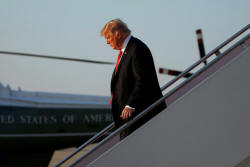|
Exclusive: U.S. steel
executives appeal directly to Trump for import
restrictions
 Send a link to a friend
Send a link to a friend
 [August 25, 2017]
By David Lawder [August 25, 2017]
By David Lawder
WASHINGTON (Reuters) - American steel
industry executives have appealed directly to President Donald Trump for
immediate import restrictions in a letter seen by Reuters, as a U.S.
Commerce Department national security probe languishes and steel imports
surge back to 2015 levels.
Senior executives from 25 U.S. steel and steel-related companies sent
the letter to Trump late on Wednesday, saying the industry was suffering
the consequences of government inaction that could change with his "bold
leadership" and "America First" vision.
"The need for action is urgent. Since the 232 investigation was
announced in April, imports have continued to surge," the executives
said in the letter.
"Immediate action must meaningfully adjust imports to restore healthy
levels of capacity utilization and profitability to the domestic
industry over a sustained period," they wrote.

A White House spokeswoman said she could not immediately comment on the
letter.
The Commerce Department has delayed the release of its recommendations
from a "Section 232" investigation into whether steel imports pose a
threat to national security, a finding that could lead to Trump imposing
broad quotas or tariffs on steel imports.
The American Iron and Steel Institute (AISI), an industry trade group,
reported on Wednesday that total steel imports through July this year
were up 22 percent from the same period a year ago, with imports taking
28 percent of the U.S. market.
Imports captured 30 percent of the U.S. market in June, according to
Commerce Department data compiled by the institute. Steel imports dipped
briefly last year because of Commerce Department anti-dumping and
anti-subsidy duties imposed on steel products from China and some other
countries.
The letter followed last week's departure of White House chief
strategist Steve Bannon, who had been a vocal advocate for steel tariffs
and other trade protections in the administration's internal debates
over trade.
'SOONER RATHER THAN LATER'
The executives from companies including Nucor Corp <NUE.N> U.S. Steel <X.N>,
ArcelorMittal <MT.AS> and Commercial Metals Co <CMC.N> said the
sustained surge of steel imports into the United States had "hollowed
out" much of the domestic steel industry and was threatening its ability
to meet national security needs.
[to top of second column] |

U.S. President Donald Trump walks from Air Force One as he arrives
at Joint Base Andrews, Maryland, U.S., August 23, 2017.
REUTERS/Joshua Roberts

"Your leadership in finding a solution to the crisis facing the steel industry
is badly needed now. Only you can authorize actions that can solve this crisis
and we are asking for your immediate assistance," they wrote.
Under the Cold War-era law authorizing the steel national security probe, Trump
would have 90 days to act once the Commerce Department submits its probe.
U.S. Commerce Secretary Wilbur Ross had set an internal deadline for announcing
his steel recommendations at the end of June, but it was delayed for a G20
summit and bilateral talks with China in July. Trump said later that month a
final decision may wait until other top priority issues on his agenda are
addressed, including healthcare and taxes.
The steel executives are concerned that the Commerce report could be delayed
further, pushing off a decision on quotas or tariffs until next year and
allowing more foreign steel to flood the U.S. market, said Philip Bell,
president of the Steel Manufacturers Association, who also signed the letter.
"This needs to be wrapped up sooner rather than later and we wanted to help the
president understand that," Bell said.

Another signatory, AISI President Tom Gibson, told Reuters the industry was
trying to keep the issue "front and center" while Trump administration officials
deal with a range of other issues from North Korea to fiscal policy.
He said that domestic steel producers' capacity utilization rate was hovering
around 75 percent, as steelmakers from South Korea to Turkey target U.S. demand
to soak up their excess output.
"Over the long term, that is not a sustainable level," Gibson said.
(Reporting by David Lawder; Editing by Tom Brown and Peter Cooney)
[© 2017 Thomson Reuters. All rights
reserved.] Copyright 2017 Reuters. All rights reserved. This material may not be published,
broadcast, rewritten or redistributed. |